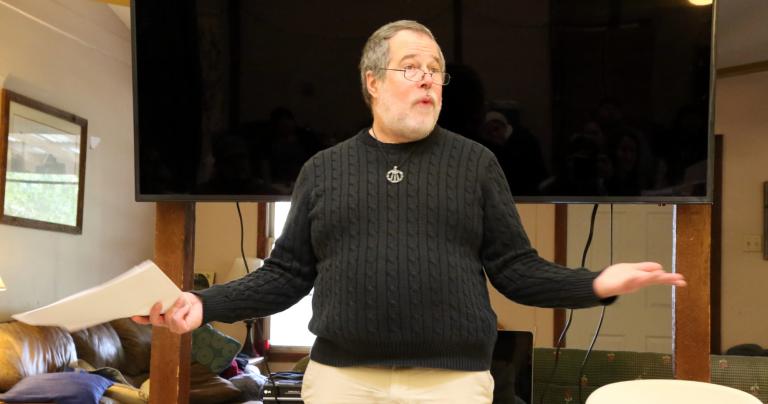There are two popular attitudes around the role of the spiritual and the mundane in our lives and both of them are wrong.
One says that everything is spiritual. We’re in constant communion with all living beings. Our Gods and ancestors walk beside us every step. We inhale energy and exhale magic. All those pesky little things like rent and disease and a dysfunctional society? Those are just distractions on our path toward enlightenment.
The other says that the spiritual is sacred, everything else is profane, and we must always keep them separate. We’ll talk about Pagan virtues in ritual but on Monday morning business is business. Keep politics out of Paganism, no matter who’s being hurt. And don’t dare bring anything from mundane society – much less from the evil corporate world – into our work as Pagans and polytheists.
Both of these approaches are unhelpful. The first subtly reinforces the Christian idea that the world is fallen and needs to be escaped. The second locks our spirituality away in temples (most metaphorical, some literal) where it remains frozen in time, unable to respond to our needs here and now. The first is a useless religion. The second is a dead religion.
A good religion stays with us always – we should not have one set of values for Pagan circles on Saturday and another set for our paying jobs on Monday. But while we may be walkers between the worlds, that doesn’t mean we live in a permanent liminal state. Sometimes we’re in sacred space but most times we’re in ordinary space.
The phrase “dual use technology” refers to items and software that can be used in both military and civilian applications. I sometimes speak of “dual use skills” – things I learn in my paying job that I can use in my religious work, or things I learn in my Pagan practice I can use in secular situations.
Here are four mundane skills that can be very helpful in spiritual applications.
Critical thinking skills
There is no more universally applicable skill than critical thinking. Also no other skill that’s in such short supply in both our wider society and in the Pagan community.
At its most basic level, critical thinking is about separating facts from opinions and about properly establishing cause and effect. It’s about separating experiences (which are undeniably true) from interpretations (which can be more or less accurate, and more or less helpful). Critical thinking is accepting that many times our knowledge must be expressed as probabilities rather than as certainties.
The biggest challenge to critical thinking is setting aside what we’ve always thought was true and what we wish was true and instead seeing what the evidence – all the evidence – tells us is true.
Critical thinking requires a rational approach and a certain amount of skepticism. It does not require materialism. Sometimes critical thinking leads us to an ordinary, this-world conclusion. Other times, though, it leads us to conclude that something Otherworldly is going on.
We need critical thinking in our religions and in our paying jobs; we need it in our spirituality and in our politics. We need critical thinking in all aspects of our lives.
Writing skills
Has my blogging improved my business communication skills, or has business communication improved my blogging? A little of both.
Like most of us, I learned composition in high school and college. I got better at it in graduate school where I wrote paper after paper. Still, Ray Bradbury’s old adage that everyone’s first million words are crap was as true for me as it is for anyone else. Best I can tell I hit a million words sometime in 2011. My blog posts from mid-2011 and on have a fairly consistent feel to them, whereas the older ones are all over the place.
Business writing taught me the value of “executive summaries.” Teenagers aren’t the only ones with short attention spans – executives don’t want to spend the time to read a wall of text either. Be concise and make things easy to read or it won’t get read.
And although ritual composition is different from both Pagan blogging and business communication, the same writing skills are helpful here too. What are you trying to communicate and how can you do it without losing people’s attention? Ritual uses more than words (good ritual does, anyway) but the principles work the same.
Speaking and presentation skills
Every place I’ve worked has either had a Toastmasters group or has encouraged employees to participate in one off-site. Virtually everyone where I work now gets coaching on making presentations: how you can communicate clearly and effectively, without losing people’s attention. And nobody gets promoted past a certain level without being at least an adequate speaker – otherwise you can’t do the job.
For me, this is a case of sacred skills being used in a secular context. I always avoided public speaking as much as I could. I learned how to do it because I wanted to lead public ritual – because I was called to lead public ritual. But the skills definitely transfer. I’m far more capable and confident in my business presentations because of all the work I’ve done leading Pagan rituals and speaking in UU Sunday services.
There has been an element of sacred theatre in ritual since at least the ancient Greeks. The skills are the same whether you use them in a sacred setting or in a mundane one.

Time management
Some Pagans like to rant against the Western obsession with time. But they’re fighting the wrong battle. The problem isn’t time management – it’s feeling like we have to do so much to avoid missing out. Or in some cases, being forced to do so much to avoid poverty and homelessness. They have a valid complaint, but rejecting time management skills doesn’t fix the problem. It just takes away one of our best tools for dealing with it.
At its core, time management is simply knowing how much time a task will take, planning your day so that you have at least that much time available to work on it, and then doing it. It can’t put more hours in the day and it can’t eliminate the need to spend some of them on things like sleep and eating and doing a few seemingly-trivial things that bring you pleasure and joy.
But when it’s time to get serious, good time management practices will help you get done what you need and want to get done, whether those things are sacred or mundane.


















